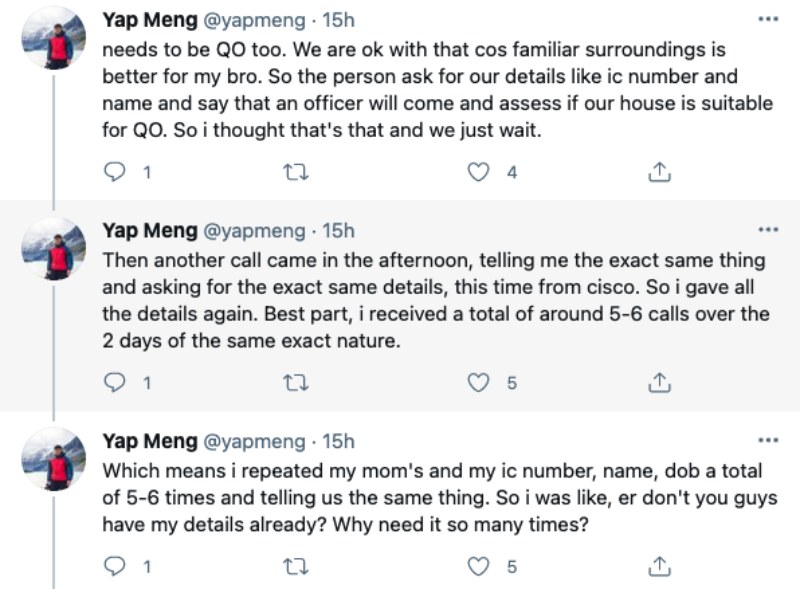MOH responds after caregivers of persons with special needs urge for empathy and clarity in Covid-19 testing, quarantine


 PUBLISHED ONJune 09, 2021 6:15 AMByAmierul RashidMohammed Zakaria
PUBLISHED ONJune 09, 2021 6:15 AMByAmierul RashidMohammed ZakariaThe Ministry of Health (MOH) will improve Covid-19 testing procedures and quarantine processes for persons with special needs, after caregivers took to social media sharing how these arrangements lack empathy and clarity.
In a Facebook post on Wednesday (June 9), Parliamentary Secretary of Health Rahayu Mahzam said the ministry is looking into engaging relevant professionals who are trained to work with persons with special needs to administer swab tests. Additionally, MOH would study the effectiveness of alternative tests she said.
"We understand their grievance and it is indeed unfortunate that they had to go through such an experience," she said.
She added that MOH will also improve communications between the various agencies involved in managing the quarantine process. "We have reminded Certis, our agent for quarantine orders, to be mindful and exercise compassion when dealing with persons with special needs," she said.
[embed]https://www.facebook.com/amyliakohhh/posts/10159407125424642[/embed]
For caregiver and special education (Sped) teacher Amylia Koh, she took to Facebook on Monday (June 7) to share her frustrations on Covid-19 testing and quarantine arrangements for her brother, a client at MINDSville@Napiri Adult Disability Home. Her post garnered over 2,000 reactions and 1,600 shares.
On June 3, Koh said the Ministry of Health (MOH) called and issued a Quarantine Order (QO) for her brother. She replied that she will be caring for her brother throughout this QO at the Government Quarantine Facilities (GQF). Her request for a home QO was rejected.
She said: "I was anxious myself because my brother would be out of his routine, in an unfamiliar setting, away from our parents. People with special needs thrive on routine and might engage in maladaptive behaviours due to change."
[[nid:531419]]
The following day, Koh was shocked to discover that she wasn’t listed as a caregiver and was prohibited from boarding the minivan to accompany her brother to the facility.
“I reiterated to the [Certis] Cisco officer that my brother is intellectually disabled and would require a caregiver’s accompaniment,” she said, and was instructed to wait for the next pick-up.
Besides being unprepared to manage such cases involving persons with special needs, a lack of compassion and understanding was seen at the swab site later according to Koh.
“I highlighted the possible difficulties that the swab team might face should they attempt to swab an intellectually disabled person via the regular throat and nasal methods, but all these fell on deaf ears,” she added.
She was told to watch from a distance as swab personnel took turns trying to swab her brother — who became increasingly frustrated and was on the brink of an aggressive meltdown.
“After a good 30 minutes, they finally heeded my suggestion and allowed me to step in and assist them,” she said.
While Koh’s experience highlighted the lack of empathy, some like Khoo Yap Meng faced issues with clarity.
The 35-year-old who works in marketing and communications confirmed with AsiaOne that his brother is a MINDSville@Napiri client.
[embed]https://twitter.com/yapmeng/status/1401931391638532097[/embed]
In his Twitter thread, he highlighted the conflicting instructions and repetitive questions he faced when speaking with either MOH or Certis Cisco. This thread has over 500 retweets.
After being issued a QO on June 3, his brother would serve his quarantine at home. Authorities requested for the family's personal details but oddly enough, Khoo received another call asking for the same information as well as the exact same details.

Dealing with conflicting information would be a recurring theme for Khoo over the next few days.
He was told his brother would have to serve QO in different locations and also had differing instructions on whether he himself needed to take the swab test.
Koh said in her Facebook post that more cases are likely to appear from such institutions – and that the relevant organisations would have to change their current approach.
[[nid:530330]]
Firstly, she suggested hiring specially trained professionals to assist frontliners to help manage people with special needs. Additionally, when it comes to procedures like swabbing or QO, she suggested using symbolic visuals, real-life picture visuals, or social stories which are resources familiar in the sped sector.
Secondly, to use non-invasive, non-traumatic testing methods to ensure people with special needs co-operate and more importantly, to avoid physical aggression directed towards front liners when agitated.
Thirdly, she suggested ensuring that the information of the families of special needs persons are relayed to respective departments consistently.
Parliamentary Secretary of Health Rahayu Mahzam in her post said that the Health Ministry has heard the feedback from caregivers.
"We recognise that the swab process and the quarantine can be more challenging for persons with special needs as they may not be comfortable with unfamiliar people or environment," she said.
"We are looking into engaging relevant professionals, as well as volunteers from the National Council of Social Service, who are trained to work with persons with special needs," she added.
In addressing the quarantine process, she said the health ministry accommodates requests for an accompanying caregiver for persons under quarantine – if they are elderly, minors or have a medical condition that prevents them from looking after themselves.
amierul@asiaone.com